#walker pearson
Explore tagged Tumblr posts
Text



















262 - “The Work Begins“
Beginning / Previously /Next
(( Thank You Next - Vitamin String Quartet ))
For easier reading, please see transcript below the cut:
Honestly, as much as I loved Obie’s suggestion, I just couldn’t focus on house hunting… not at that moment, anyway.
Imane, understood, but agreed with Obie. Though she feared we’d be priced out the longer we waited, we all agreed that the hunt could wait a few more months, just no more than six. So, we stuck a pin in it and put all our energy into the wedding.
Dev & Dirk came in clutch helping us secure The Pinnacle Gardens; and with the big wheels in motion, our attention could finally turn toward the fine details. The fun parts…
Noble Designs in Willow Creek | Two weeks later:
G: Welcome home baby girl! It’s so good to see you!
W: It’s good to be back! Thank you so much for doing this. I really appreciate it.
G: Chile, please! I’ve been waiting for this day since your mama told me you were moving West to pursue that boy.
N: I said no such thing! *Walker giggles*
G: Mhmm… Come. We have a private suite for you, and everyone is waiting upstairs.
W: Aunt Glo, that wasn’t necessary—
G: Nonsense! Nikki tells me you’re looking for the more fitted silhouettes— trumpet and mermaid—
W: Yes, but I’m open to being surprised.
G: Smart girl.
N: Tea length might be nice too.
W: Yeah. I’m leaning more toward romantic than sexy.
G: That we can do. Let’s find your dress!
#always walker#sims of color#black simblr#walker pearson#nicole pearson#gloria nobles#imane ferhat#obie tremblay#trumpets0ng
44 notes
·
View notes
Text

⚡️🌩️⚡️
#Marvel#Marvel Comics#MCU#Dan Hipp#Jake Schreier#Eric Pearson#Joanna Calo#Kevin Feige#The Thunderbolts#Thunderbolts#Thunderbolts*#The New Avengers#Yelena Belova#Black Widow#Florence Pugh#Bucky Barnes#The Winner Solider#Sebastian Stan#Alexei Shostakov#Red Gaurdian#David Harbour#John Walker#U.S.Agent#Wyatt Russell#Robert Reynolds#Sentry#Lewis Pullman#Ava Starr#Taskmaster#Hannah John Kamen
3K notes
·
View notes
Text
Went to go see Thunderbolts* in the theatres again (I saw it for the first time two days ago) and it made me realise how genuinely excited I am for this new phase of the MCU. It takes a complete pivot in a darker tone and a new hope is being created, we get more of an emotional connection with all of our new Avengers.
Thunderbolts* not only takes one of the biggest themes of second chances but tackles grief, anxiety, depression, loneliness, isolation, self harm, addiction and so much more.
Directed by Jake Schreier and written by Eric Pearson and Joanna Calo. This team of talented industry professionals were able to expand on our beloved antihero’s and give them an emotional journey that interconnected them through and beyond bob’s past to not only create such humanity within established comic book characters but an enormous amount of empathy and compassion.
#thunderbolts*#thunderbolts spoilers#marvel thunderbolts#mcu#marvel cinematic universe#marvel#ghost marvel#bucky barnes#yelena belova#bob reynolds#robert reynolds#sentry#the sentry#the void#john walker#jake schreier#eric pearson#joanna calo
30 notes
·
View notes
Link
A Different Man, from A24, presents a surprising story, as an aspiring actor with a severe deformity participates in a clinical trial, and by a miracle the transformative procedure works, leaving the past, he thinks, behind
#Janet Walker#Haute-Lifestyle.com#The-Entertainment-Zone.com#HL-Productions#A Different Man#a24 films#sebastian stan#the apprentice#adam pearson#renate reinsve
7 notes
·
View notes
Text
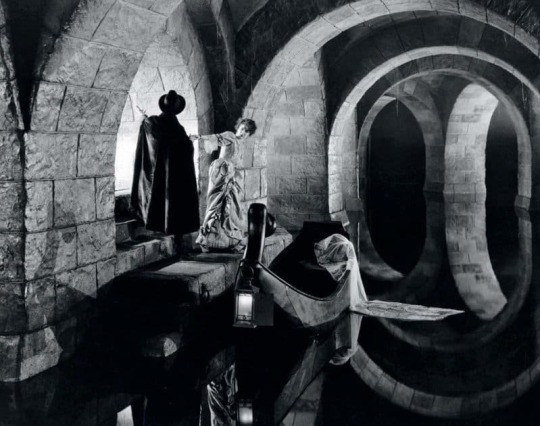
Movie Odyssey Retrospective
The Phantom of the Opera (1925)
By the time French journalist-turned-novelist Gaston Leroux published Le Fantôme de l'Opéra as a serial in 1909, he was best known for his detective fiction, deeply influenced by Sir Arthur Conan Doyle and Edgar Allan Poe. The Phantom of the Opera plays out like a Poe work – teeming with the macabre, painted with one character’s fanatic, violent lust. In serial form and, later, as a novel, Leroux’s work won praise across the West. One of the book’s many fans was Universal Pictures president Carl Laemmle who, on a 1922 trip to Paris, met with Leroux. While on the trip, he read Phantom (a copy gifted to him by Leroux) in a single night, and bought the film rights with a certain actor already in mind.
Laemmle’s first and only choice for the role of the Phantom was about to play Quasimodo in Universal’s 1923 adaptation of Victor Hugo’s The Hunchback of Notre Dame. That actor, Lon Chaney, had subsisted on bit roles and background parts since entering into a contract with Universal in 1912. Chaney, who was about to sign a contract with Metro-Goldwyn-Mayer (MGM), became an instant sensation the moment The Hunchback of Notre Dame hit theaters. Audiences and critics in the early 1920s were simultaneously horrified at the sight of his Quasimodo yet, crucially, felt a profound empathy towards the character.
In his prior films, as well as Hunchback, Chaney separated himself from his fellow bit actors with a skill that almost no other actor in Hollywood possessed: he was also a makeup artist. At this time, actors applied their own makeup – often simple cosmetics or unconvincing facial hair. None of the major Hollywood studios had makeup departments in the early 1920s, and it would not be until the 1940s that each studio had such a department. Chaney, the son of two deaf and mute adults, was also a master of physical acting, and could expertly use his hands and arms to empower a scene. Though already bound for MGM, Chaney could not possibly pass up the role of Erik, the Phantom. Despite frequent clashes with director Rupert Julian (1923’s Merry-Go-Round and 1930’s The Cat Creeps; despite being Universal’s most acclaimed director at this time, Julian was either sacked or walked away mid-production), Chaney’s performance alone earned him his place in cinematic history and, for this film, an iconic work of horror cinema and silent film.
As the film begins, we find ourselves at the Palais Garnier, home of the Paris Opera. The Opera’s management has resigned, turning over the Palais Garnier to new ownership. As the ink dries on the contract and as the previous owners depart, they warn about a Phantom of the Opera, who likes sitting in one of the box seats. Soon after, prima donna Carlotta (Virginia Pearson) receives a threatening letter from the Phantom. She must step aside and allow a chorus girl, Christine Daaé (Mary Philbin), sing the lead role in Charles Gounod’s Faust. If she refuses to comply, the Phantom promises something horrific. Aware of the letter, Christine the next day confers with her loved one, the Vicomte Raoul de Chagny (Norman Kerry), that she has been receiving musical guidance from a “Spirit of Music”, whom she has heard through the walls of her dressing room. Raoul laughs this off, but a series of murderous incidents at that evening’s production of Faust is no laughing matter. Christine eventually meets the shadowy musical genius of the Phantom, whose name is Erik (Chaney). In his subterranean lair, he professes his love to her – a love that will never die.
Rupert Julian’s The Phantom of the Opera also stars Arthur Edmund Carewe as the Inspector Ledoux (for fans of Andrew Lloyd Webber’s musical version, this is the Madame Giry character); Gibson Gowland as Simon Buquet; and John St. Polis as Raoul’s brother, the Comte Philippe de Chagny.
Before extoling this film, one has to single out Mary Philbin and Norman Kerry as the glaring underperformers in this adaptation. Philbin would become a much better actress than she displays here, if The Man Who Laughs (1928) is any indication. Yet, Philbin’s Christine is a blank slate, devoid of much personality and interest. It also does not help that Norman Kerry plays Raoul in a similar fashion. Raoul, in any adaptation of Phantom, tends to be a boring role. But goodness me, for a B-actor who was acclaimed for his tall, dark, and handsome looks and screen persona, he is a charisma vacuum here. During Kerry’s more intimate scenes with Philbin, you may notice that Kerry has a case of “roving hands” when he gets close with Philbin. Philbin, who could not visibly react to these moments on-camera, surreptitiously took Kerry’s hands and held them there to stop the touching.
Philbin is much better when sharing the screen opposite Chaney. Chaney and Philbin both could not stand director Rupert Julian – whom both actors, as well almost all of the crew, regarded as an imposing fraud who knew little about making art and more about how to cut costs (Laemmle appointed Julian for this film in part due to Julian’s reputation for delivering work under budget). There are unconfirmed accounts that after Julian’s departure or removal from Phantom, Chaney himself directed the remainder of the shoot aside from the final climactic chase scene (which was the uncredited Edward Sedgwick’s responsibility). In any case, Philbin’s terror when around Chaney was real. The sets of the Phantom’s lair reportedly spooked her – the subterranean waterways, his inner sanctum. Philbin also received no preparation before the filming of what is now one of the signature moments of the silent film era and all of horror cinema. Her reaction to Lon Chaney’s self-applied makeup – meant to appear half-skin, half-skeletal – was the first time that she saw Chaney’s Phantom in all his gruesomeness. Philbin, freed of the innocent, pedestrian dialogue of the film’s opening act, gifts to the camera one hell of a reaction, fully fitting within the bounds of silent film horror.
There are conflicting records on how Chaney achieved the Phantom’s final appearance. The descriptions forthcoming are the elements that freely-available scholarship generally accepts as true. It appears that Chaney utilized a skull cap to raise his forehead’s height, as well as marking deep pencil lines onto that cap to accentuate wrinkles and his brow. He also raised his cheekbones by stuffing cotton into his cheeks, as well as placing a set of stylized, decaying dentures. Inner-nasal wiring altered the angle of his nose, and white highlights across his face contributed to his skeletal look for the cameras. Cinematographer Charles Van Enger (1920's The Last of the Mohicans, uncredited on 1925's The Big Parade) – who, other than Chaney, was one of the most familiar onset with Chaney’s makeup – claimed that the nasal wiring sometimes led to significant bleeding. Taking inspiration from Chaney’s approach to keeping the makeup artistry hidden from Philbin and others, Universal kept the Phantom’s true appearance a secret from the public and press. The studio advised movie theaters to keep smelling salts ready, in case of audience members fainting during the unmasking scene. According to popular reporting at the time, audience members did scream and faint upon the reveal; a nine-year-old Gregory Peck’s first movie memory was being so terrified of Lon Chaney’s Phantom, that he asked to sleep with his grandmother that evening after he came home.
youtube
Lon Chaney’s tremendous performance allows The Phantom of the Opera to soar. Arguably, it is his career pinnacle. Masked or unmasked, Chaney’s Phantom dominates the frame at any moment he is onscreen aside from the film’s final chase sequence. Whether glowering over Christine, majestically gesturing in silhouette, strutting down the Opera House steps during the Bal Masqué, or tucked into the corner of the frame, Chaney’s physical presence draws the audience’s eyes to whatever he is doing. The differences in posture from before and after the unmasking scene are striking – from an elegant specter to a broken, hunched figure (appearing to draw some inspiration from his experience playing Quasimodo two years earlier) seething with pent-up carnality, rage, and sorrow. Chaney’s Phantom garners the audience’s sympathy when he gives Christine the grand tour of his chambers. Look at his posture and hands when he mentions, “That is where I sleep,” and, “If I am the Phantom, it is because man’s hatred has made me so.” That Chaney can ease through these transitions and transformations – as well as a third transformation, as the Red Death during the Bal Masqué – so naturally, without a misstep, is a testament to his acting ability.
Underneath the tortured and twisted visage of a man who has committed horrific acts is a vulnerable and misguided human being. His dreams, dashed and discarded by all others, have turned to despicable means. The role of the Phantom plays brilliantly to Chaney’s genius: to have audiences sympathize with even the most despicable or despondent characters he played. Chaney accomplishes this despite this film characterizing the Phantom with less sympathy than Leroux’s original novel and the popular Andrew Lloyd Webber musical.
This is already on top of Charles Van Enger’s camerawork; the sharp editing from a team including Edward Curtiss (1932’s Scarface) Maurice Pivar (1923’s The Hunchback of Notre Dame), Gilmore Walker (1927’s Uncle Tom’s Cabin), and Lois Weber.
Weber, who in 1916 was Universal’s highest-paid director, underwent numerous financial difficulties over that decade. One of Hollywood’s first true auteurs and largely ignored in the history of film until recently, Weber formed her own production company with Universal’s assistance in 1917, off the success of Shoes (1916). Through World War I, Weber’s movies were popular until around the turn of the decade, when her “didactic” filmmaking (a result of her devout Christian upbringing) went out of style. Most visibly among Weber’s financial failures of the early 1920s, The Blot (1921) – a movie that scholars and Weber himself considered her best – flopped in theaters. After two hiatuses from filmmaking in the early 1920s, Weber was brought in to conduct the final bits of editing on The Phantom of the Opera before returning to directing under Universal.
Though none of the film’s production designers were yet to hit their peak, The Phantom of the Opera benefitted from having a soon-to-be all-star art department including James Basevi (1944’s The Song of Bernadette), Cedric Gibbons (almost any and all MGM movies from 1925 onward), and Robert Florey (1932’s Murders in the Rue Morgue). Inspired by designs sketched by French art director Ben Carré, the production design trio spared no expense to bring Carré’s illustrations to life and used the entirety of Universal’s Soundstage 28 to construct all necessary interior sets. The set’s five tiers of seating and vast foyer needed to support several hundred extras. So unlike the customary wooden supports commonplace during the silent era for gargantuan sets, The Phantom of the Opera’s set for the Palais Garnier became the first film set ever to use steel supports planted into concrete. Basevi, Gibbons, and Florey’s work is glorious, with no special effects to supplement the visuals. The seventeen-minute Bal Masqué scene – which was shot in gorgeous two-strip Technicolor (the earliest form of Technicolor, which emphasized greens and reds) – is the most striking of all, unfurling its gaudy magnificence to heights rarely seen in cinema.
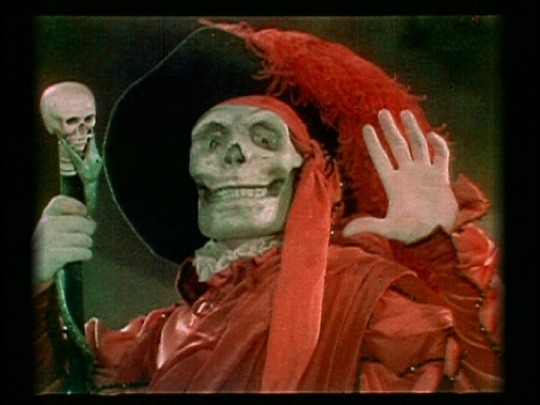
Universal’s Soundstage 28 was an integral part of the VIP tour at Universal Studios Hollywood for decades. Though the orchestra seats and the stage of the film’s Palais Garnier had long gone, the backside box seats of the auditorium remained. Stage 28 featured in numerous films after The Phantom of the Opera, including Dracula (1931), the Lon Chaney biopic Man of a Thousand Faces (1957), Psycho (1960), Charade (1963), Jurassic Park (1993), How the Grinch Stole Christmas (2000), and The Muppets (2011). The soundstage was also supposedly haunted, with individuals claiming to see a caped figure (Lon Chaney as the Phantom?) running around the catwalks, lights flickering on and off, and doors opening and closing on their own. In 2014, after standing for almost ninety years, Universal decided to demolish Stage 28 so as to expand its theme park. However, the historic set escaped the wrecking ball, as Universal decided to disassemble the set, place it into storage, and perhaps someday reassemble it. It is a fate far kinder than almost all other production design relics from the silent era.
Unlike what was coming out of Weimar Germany in the 1920s in the form of German Expressionism, American horror films had no template to follow when The Phantom of the Opera arrived in theaters. There would be no codification of American horror cinema’s tropes and sense of timing until the next decade. But without 1925’s The Phantom of the Opera, Universal would never become the house of horror it did in the 1930s through the early ‘50s (including the Dracula, Frankenstein, Mummy, Invisible Man, Wolf Man, and Creature from the Black Lagoon series). So, unbound by any unwritten guidelines, 1925’s The Phantom of the Opera – a horror film, but arguably also a melodrama with elements of horror – consumes the viewer with its chilling atmosphere and, from Lon Chaney, one of the best cinematic performances ever, without any qualification. For silent film novices, this is one of the best films to begin with (outside the comedies of Charlie Chaplin, Buster Keaton, and Harold Lloyd). Regardless of one’s familiarity with silent film, The Phantom of the Opera is a cinematic milestone.
My rating: 9.5/10
^ Based on my personal imdb rating. My interpretation of that ratings system can be found in the “Ratings system” page on my blog. Half-points are always rounded down.
For more of my reviews tagged “My Movie Odyssey”, check out the tag of the same name on my blog.
This is the twenty-third Movie Odyssey Retrospective. Movie Odyssey Retrospectives are reviews on films I had seen in their entirety before this blog’s creation or films I failed to give a full-length write-up to following the blog’s creation. Previous Retrospectives include Dracula (1931 English-language version), Oliver! (1968), and Peter Pan (1953).
#The Phantom of the Opera#Rupert Julian#Lon Chaney#Mary Philbin#Norman Kerry#Carl Laemmle#Gaston Leroux#Ernst Laemmle#Edward Sedgwick#Arthur Edmund Carewe#Gibson Gowland#Snitz Edwards#Virginia Pearson#Edward Curtiss#Maurice Pivar#Gilmore Walker#Lois Weber#silent film#TCM#My Movie Odyssey
8 notes
·
View notes
Text
51 reads in 2024: a year in review
51 Books in 2024 2024 was absolutely BONKERS. Ian and I both got new jobs (I actually moved to a company that had been my dream to work at for so long!), we moved out of our house for a handful of months due to a home renovation, we dug out and underpinned our basement, and of course had many children’s activities and LIFE. At one point we slept under 6 different roofs in 2 countries within 3…
#A Well-Trained WIfe#Bethany Joy Lenz#book review#by Hunter Clarke-Fields MSAE and Carla Naumburg#by Kristen Hannah#cassandra clare#Charissa Weaks#Demi Moore#Dinner with Vampires#Emily Henry#Exit Interview by Kristi Coulter#Frieda McFadden#Funny Story#Happy Place#If You Would Have Told Me#Inside Out#John Stamos#Lauren Roberts#Mary E. Pearson#miranda july#Powerless & Reckless#Raising Good Humans#Reed Hastings and Erin Meyer#Swordcatcher#The Courting of Bristol Keat#The Housemaid#The Hunger Games#The Idea of You by Robinne Lee#The Kiss of Deception#The Witch Walker series
0 notes
Text

Mary Murphy rounds off the final day of the Children’s Books Ireland International Conference 2019 in Dublin, speaking on the conference theme of ‘Belonging’, and unveiling two forthcoming picture books.

#mary murphy#book illustration#picture books#children's books ireland#walker books#otter-barry books#clare pearson literary agent
0 notes
Text
Mytimetoshine who had leaked the og script all the way back to 2023 coming out to tell what exactly Taskmaster's story would be like after Eric Pearson came out to say she would not only survive but have a bond with Ava... bruh she should have been at the club SHE WAS JUST A BABY FUCK U MARVEL
Anyway, spoilers for something that they didnt film i guess, Antonia's reason to be there at all in that Val promissed to help her cure her brain of the damage inflicted by Natasha's explosion when she was a kid(9 years old), that now, without her father's control, is heavily affecting her memory(like in the comics)
SHE WOULD LOVE SKITTLES ALSO???? SHE WOULD SHARE THEM AROUND WITH THE OTHERS WHEN THEY WERE RESTING??? Its mentioned a couple of times, more often than not it feels like Antonia is more confused at everything than anything else and its what triggers the others, specially Ava to be protective which u know, ironic as fuck considering who gave her the final shot in the movie
Also the team instead of getting angry or tired about her lapses in memory and her attacking walker because of it are more worried for her than anything else, specially, obviously, Yelena, Bucky and Ava, Ava who btw makes a video to help Toni get through her episodes.
THERE IS MORE I CAN'T REMEMBER NOW BUT ANYWAY, bro taskmaster got robbed so bad 😭
I genuinely feel like shit for Olga Kurylenko and her character they both deserved so much better to the point that i went from "whatever" to the character to actively wishing they bring her back and develop her as they should have done.
Now we know why ghost felt so off from the rest of the team as well, her main bond would be with Antonia and since they cut her off...
#taskmaster#antonia dreykov#avatoni???#idk but everything about them sounded cute af#the thunderbolts#the new avengers lmao#ava starr#yelena belova#ghost#blackwidow#john walker#bucky barnes#alexei shostakov
132 notes
·
View notes
Text















264- “Click-Clack“
Beginning / Previously /Next
(( Made You Look - Meghan Trainor ))
For easier reading, please see transcript below the cut:
D: Welcome, ladies, to Penthouse Dreamer!
*gasps & chatter*
A: Holy gnomes! Devon, this place is incredible!
D: Thanks! Ok, so here’s the deal... We’ve got two bedrooms on this level; just through there and two more upstairs across from mine. No assignments, just make yourselves at home.
C: Would you guys be open to ordering some Sulanese, tonight? Maybe Tomarani—
P: Actually, we made a reservation at The Black Orchid for 8:15. This is your first time in San My, after all *wink*.
W: Ooh… I’ve never been either!
D: *chuckles* We know. Go freshen up! This is a sexy-sister dinner. Heels in the hall in thirty!
#always walker#walker pearson#devon lane#penny pizzazz#anitha tremblay curtis#clementine tremblay brenner#sims of color#black simblr#trumpets0ng
34 notes
·
View notes
Text

🌩️⚡️🌩️
#Marvel#Marvel Comics#MCU#Stephen Byrne#Theunderbolts#The New Avengers#The Thunderbolts#Thunderbolts*#Jake Schreier#Eric Pearson#Joanna Calo#Kevin Feige#Yelena Belova#Black Widow#Florence Pugh#Bucky Barnes#The Winner Solider#Sebastian Stan#Alexei Shostakov#Red Gaurdian#David Harbour#John Walker#U.S.Agent#Wyatt Russell#Robert Reynolds#Sentry#Lewis Pullman#Ava Starr#Taskmaster#Hannah John Kamen
523 notes
·
View notes
Text
They shoulda done it so Ghost shot Antonia and then after when they’re just outside the compound after Bob flew and crash landed, Toni shows up looking singed as hell and a bullet indent in her forehead
Yelena: How—
Toni: You just left me there??? And took my stuff?!
Ava: Ohhhhh, shit. Whoops.
Walker: *points at Ava* She did it.
Boom, the Ava/Toni kicks off in earnest from there
Edit: I meant to say “Ava/Toni arc” (aka, the one first intended and written by the film’s initial writer Eric Pearson) but sure, let it also be gay
#thunderbolts#thunderbolts spoilers#taskmaster#antonia dreykov#ghost#ava starr#yelena belova#john walker
106 notes
·
View notes
Text
Making a (semi incomplete) list of NHLers whose names are just words. Why? Because I’m very bored and I find this funny. Do with this information what you will.
(Non English words count but also I only speak English and high school level Italian which I took almost 20 years ago, so let me know who I missed)
Does not include AHL or other non-nhl-roster players.
Gold Star Words: Cody Glass, Brett Pesce (Italian for fish), Andrew Mangiapane (Italian for eat bread), Ethen Frank, Troy Terry, Patrick Brown, Owen Power, Jordan Greenway, Morgan Frost, Dryden Hunt, Jake Bean, Dustin Wolf, William Carrier, Taylor Hall, Brent Burns, Pat Maroon, Ethan Del Mastro (Italian for of the master), Wyatt Kaiser, Spencer Knight, Miles Wood, Oskar Bäck, Sam Steel, Brendan Smith, Dominik Shine, Craig Smith, Connor Brown, Jeff Skinner, Darnell Nurse, Stuart Skinner, Devin Shore, Alexandre Carrier, Kieffer Bellows, Michael Bunting, Luke Evangelista (Italian for…evangelist), Zachary L’Heureux (French for “the happy one”), Cole Smith, JT Miller, Adam Fox, K’Andre Miller, Jonathan Quick, Nick Cousins, Shane Pinto, Bobby Brink, Sean Couturier**, Tyson Foerster (German for…forester), Bryan Rust, Ryan Graves, Logan Couture, Will Smith Hockey (both Smith and Hockey are words), Jake Neighbours, Nathan Walker, Cam Fowler, Tyler Tucker, Brayden Point, Conor Garland, Reilly Smith, Mark Stone, Alex Pietrangelo (Italian for stone angel), Zach Whitecloud, Adin Hill, Cole Perfetti (Italian for perfect), Colin Miller.
Total: 63
** google will tell me that it is a word but not exactly what it means. Something with women’s clothing.
Honorable mentions (would be a word with different spelling): Jack Hughes, Luke Hughes, Quinn Hughes, Taylor Raddysh, Morgan Geekie, Joseph Woll, Andrew Peeke, Alex Tuch, Kyle Burroughs, Kevin Bahl, Charlie Coyle, Christian Fischer, Roope Hintz, Patrick Kane, Andrew Copp, Justin Holl, Jeff Petry, Moritz Seider, Alex Lyon, Zach Hyman, Trevor Moore, Justin Barron, Owen Tippett, Nick Seeler, Connor Dewar, Shane Wright, Vince Dunn, Yanni Gourde, Darren Raddysh, Morgan Barron.
Total: 29
Honorable mentions (it’s two complete words but not a usable compound word): Jeremy Swayman, Logan Stankoven, Riley Stillman, Mackenzie Blackwood, Scott Wedgwood, Colin Blackwell, Quinton Byfield, Alex Newhook, Scott Mayfield, Matthew Highmore, Barclay Goodrow, Nils Hoglander, Tanner Pearson, Mason Appleton.
Total: 15
UPDATES!
Suggestions from people who speak more languages than me
Gold Star Words: John Marino (Spanish for marine), Scott Morrow, Jordan Staal (Dutch for Steel), Sebastian Aho (Finnish for clearing, Japanese for idiot, and several other definitions in several other languages), Jesper Fast, Adam Fantilli (Italian for infant), Dante Fabbro (Italian for smith), Noc Dowd (Noah says it’s an out of fashion English word), Juuse Saros*, Patrik Laine (Finnish for wave), Mikko Rantanen (Finnish for small beach), Joel Kiviranta (Finnish for stony beach), Rasmus Kupari (Finnish for copper), Kris Letang (French for the pond), Joey D'accord (French for okay), Brad Marchand (French for merchant)
Promoted from Honorable Mention to Gold Star: Christian Fischer (German for Fisher), Alex Tuch (German for cloth)
Honorable Mention (homophones): Ian Cole, Jesper Bratt
Honorable Mention (non-valid compound words): Jalen Chatfield, Filip Forsberg (waterfall and hill in Swedish), Mikhail Granlund (Spruce Grove in Norwegian).
*some sort of astrological situation. Check the comments for an explanation from @fresh-penguin
#okay my excuse for forgetting Bratter is that I didn’t start including homophones until after I had swept the devils#I forgot Jack and Luke until I got to the Canucks and was like ‘oh right. hues.’
126 notes
·
View notes
Text
The Long Walk characters are very different in the movie
As per the Vanity Fair article:
Garraty in the movie is "certainly the most big-hearted" of the Walkers. Which he isn't at all, in the book. He's very close to a few people, but if anything he seems less attached to his friends than McVries does (see: Harkness, Scramm, Pearson, Parker), and he's less caring towards random people than Baker. Mostly Garraty is motivated by curiosity when he talks to other Walkers. He's kind of an asshole to most people.
The article also says that Garraty "enters the race to get vengeance on leaders he despises, pursuing the wishes of his resistance-minded dad". Which in the book, he absolutely doesn't. His entire character revolves around repression, guilt, and insecurity that motivates him to join the Walk. It has nothing to do with vengeance. This isn't a small change - it makes Garraty's character, and the entire story, completely different.
Hoffman adds that "Garraty believed wholeheartedly that his father was fighting for the exact right thing, and his father could do no wrong", but Garraty goes into the Walk in the book thinking that his father is an idiot, or at least naive. He also explicitly says later that he didn't miss his father after he was Squaded. So Garraty in the movie will be very different, and the movie will apparently be a story of political rebellion.
"Jonsson, who’s 31, brings a more hardened and mature presence to McVries", but McVries is not even remotely mature in the book. He's full of teenage angst and emotional immaturity and a twisted sense of loathing towards himself and everything else. It doesn't look like he has that prominent scar in the movie, either.
Baker is black in the movie. In the book, he was a night rider for two years. Go figure.
This is Stebbins in the movie. Go figure.

So overall, I can't see any of the three main characters being at all similar to their book counterparts. Baker still has a shot, because the night riding isn't a core part of his character, but given the track record so far I'm not very optimistic.
Also, the numbers are random now! Garraty is still #47 and Barkovitch is still #5 but the others have changed, even Baker, for some reason.
Also, apparently Mark Hamill "brings complexity and and even some vulnerability" to the Major. To the Major. what
The only thing I'm excited for is Joshua Odjick as Parker, because this here is a very Collie Parker expression.

#the long walk#tlw#tlw movie#ray garraty#peter mcvries#art baker#stebbins#collie parker#the major#cooper hoffman#david jonsson#francis lawrence#jt mollner#stephen king#joshua odjick#garrett wareing#tut nyuout#mark hamill
64 notes
·
View notes
Text
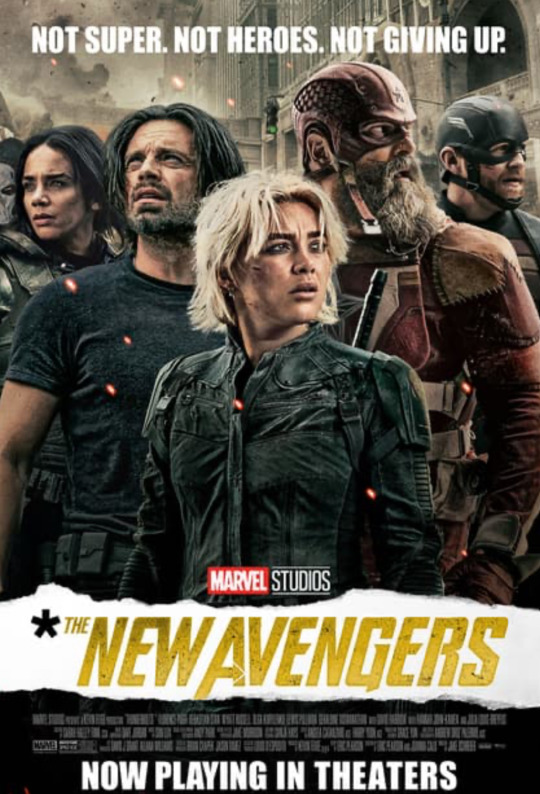
TW: Mentions/discussion of mental health and depression.
While I don’t think that Thunderbolts* is the best film since Endgame, since those are big shoes to fill, this was one of the stronger showings that I’ve seen from Marvel in a long time (minus the treatment of Taskmaster, wish they made her part bigger). All of the characters blended perfectly together. We see how they’re interactions from enemies (under the manipulation of Valentina Allegra de Fontaine) to ultimately becoming a team, alongside Alexi and Bucky (who is a congressman now in this film. I will explain my thoughts about my feeling on this later in the review).
The chemistry between Florence, Wyatt, David, Lewis, Hannah, Julia Louis, and Sebastian felt natural. The quick quips and references didn’t feel shoved down our throats as it pertained to the moat recent film that Marvel had unleashed. (Spoilers for Captain America: Brave New World will be referenced in the beginning of this film, so if you haven’t see the clips or the film, I recommend seeing that before seeing this film). The raw emotion that came from Yelena was genuine. You can feel the heartbreak, loneliness, and darkness fill her to the brim. It breaks your heart that after losing her sister, she feels she has no one and it’s gut wrenching to hear how she copes with that.
The themes of mental illness/depression and guilt are center-stage in this movie. With Bob/Sentry, there are moments when he loses his sanity and it becomes one of the more shocking elements to the movie as he is presented as a pure, innocent person who was taken advantage of by Valentina. This is one of the points that Calo and Pearson wanted to make was that innocent, good people who may struggle with there own battles are more susceptible to deception and the grief of their struggles/depression can take over you if you bottle it up. However, if you bottle those emotions up, it’s bound to overtake you eventually and put you in this void that you can’t escape unless you confront it head on. It’s heartbreaking but true in our society. Yelena gets expansion of her time in the Red Room which was brutal to see as we saw all of the things she had to witness/do during those days. From being forced to killing one of her friends to witnessing her “friends” getting whipped because they couldn’t put their gun together fast enough left a queasy feeling in my stomach, but that was the effect that Schreier wanted to create. In the climax, when Yelena enters that void to save Bob, she has to relive those moments. This time, though she protects her younger self from having to witness those things. Desperately trying to not run away from the past, we see her protecting her younger self from this. It’s something that anyone, including me can relate to and it broke my heart to see Yelena in this state. However, her journey from not believing of having purpose to gaining a family among Bob, Bucky, Ava, and Alexei (her dad during her time in the red room), ultimately becoming the New Avengers. Yelena and Bucky were my favorite characters, along with Alexei and Bob in this film. They have a great mixture of vulnerability, humor, and humanity to them that most movies nowadays don’t seem to execute well. There’s always one or another but never together and the way that each character was written fit them perfectly to a tee. (Though, okay minor spoiler, John Walker ends up alone with Olivia leaving him with their son). This caught me off guard because I personally loved Olivia because along with Lamar, she was the only other person that he had left that kept him grounded. By removing him, he went off the deep end and he became an asshole throughout the movie. Though he does become less of that bitter asshole throughout the movie, which is nice to see I’m still on the fence about this character. However, I can understand how this decision of removing Olivia and his son in his life ties into his deteriorating mental health, still would’ve been nice to see how this came to fruition since they seemed to be a united front in The Falcon and The Winter Soldier series. The ending is where it gets really heavy as we see Bob fighting the void slowly becoming his depression/demons until Yelena and the Thunderbolts comfort him to let him know that they have him and that they’ll never be alone again.
One of the things I loved about this movie is there are no gimmicks in the action scenes, no over the top spectacles, just pure action sequences and moments that left me stunned and raw with anticipation. When Bob becomes Sentry/Void take over him, I genuinely was terrified for the Thunderbolts* crew and how they were going to stop this darkness from overtaking New York City. The stakes feel realistic in this film compared to other films I’ve watched (e.g. Snow White and Kraven the Hunter). The score and color palette sets the mood of despair and desperation, seeing the people fleeing for their lives, only to be sucked into that void by Sentry. Also, the scene where Bucky is riding his motorcycle trying to get Ava, Yelena, John, and Alexei (despite not having anything to do with Valentina) in an attempt to indict her. It’s so badass and Alexei celebrating his triumphant return which he believes as the Winter Soldier is icing on the cake (minus him calling him the Winter Soldier). Still, Alexei was the perfect mixture of humor and support that the film needed to balance out the film between comedic and comfort that Yelena needed in that moment.
Some things that didn’t make sense to me was some of the characters’ involvement with Valentina (who should’ve been indicted! God I want to hate her but god was she so full of life and Dreyfus’s really soaked up the role of Valentina). I mean, I understand Yelena and John’s involvement with Valentina, however I still was perplexed on how Ava and Antonia/Taskmaster were involved with her. Other than the factor that Ava used to do contract kills (stated in Ant-man and the Wasp, they never go into detail about who she worked for). I wish there was a moment where they could clarify this. I also think that they could’ve utilized Taskmaster better. Because after being free from her father’s mind control, I’d imagine the last thing she’d want to do is more killings. I wanted to see her character developed over time and not killed off in the first thirty minutes of the film (Sorry spoiler, but the trailer kind of gave that away tho). There was so much that she could’ve unpacked since her last appearance in Black Widow and how the development of Yelena and her relationship grew into bonding over there time in the Red Room would’ve been something I would be down for. However, Yelena defending her after Ava and John speak negatively of her speaks volumes to the horrors she endured and didn’t want anyone to speak down on the actions she couldn’t choose for herself.
Another aspect of the film that felt out of left field was Bucky becoming a congressman. Sure, it was mentioned in Captain America: Brave New World but briefly. As much as it seemed like a great move for the character, it was completely underdeveloped. I wanted more exploration from his slow rise to power and wish there could’ve more clarification on how he became congressman and what measures he put in, as well as his involvement with Valentina. Despite this, it was nice to see him become a confidant for Val’s assistant, Mel who struggles to do the right thing involving the Sentry project and staying loyal towards Valentina. They had a nice dynamic and something that I hope gets expanded on in further projects. One last thing is I wish we saw more of the darkest moments in each character’s lives, just so we could see how the development comes into play over the course of the film (besides Yelena, John, and Bob)
Overall, this is a great movie but one I do not recommend seeing alone if you do struggle with mental illness, particularly depression.
P.S. Stay through the end as there are two post credit scenes and the second one sets up for the Fantastic Four/Avengers Doomsday movie!
GIF represents the central theme of the movie which is family.

#thunderbolts*#movie review#marvel cinematic universe#bucky barnes#John walker#alexei shostakov#ava starr#taskmaster#valentina allegra de fontaine
21 notes
·
View notes
Text
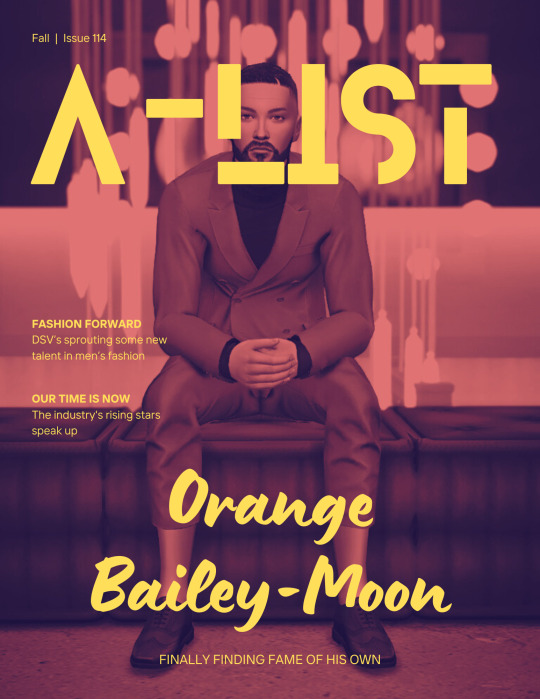
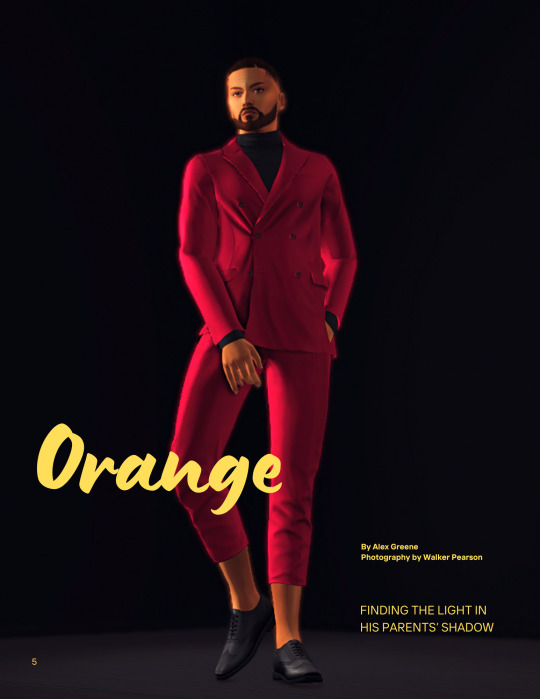
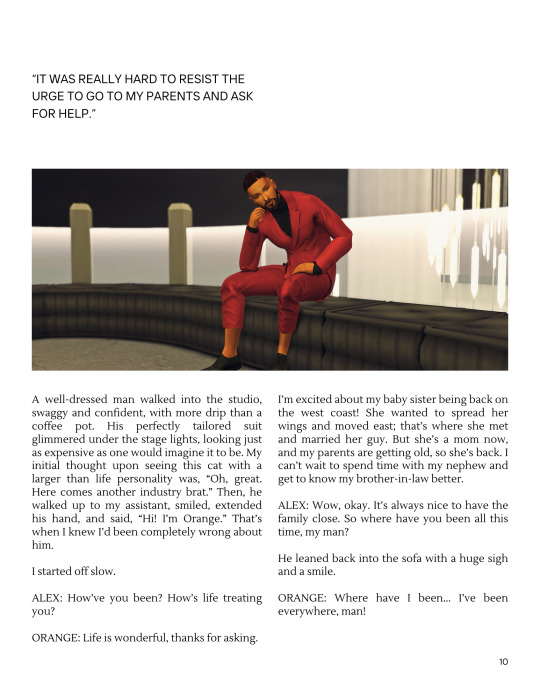
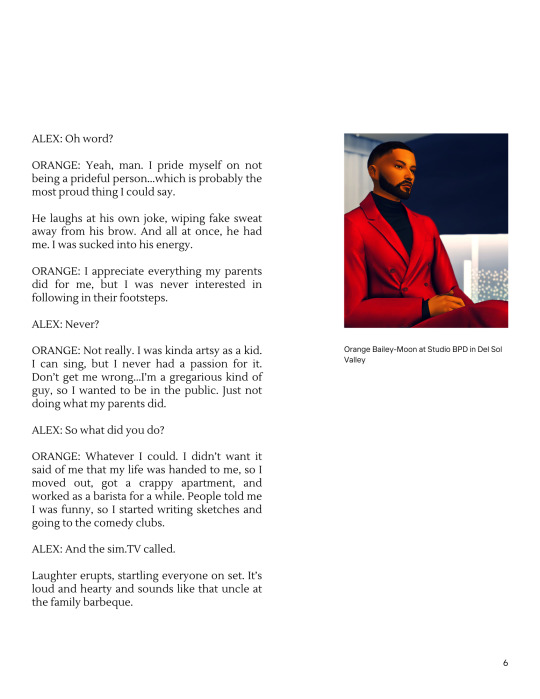
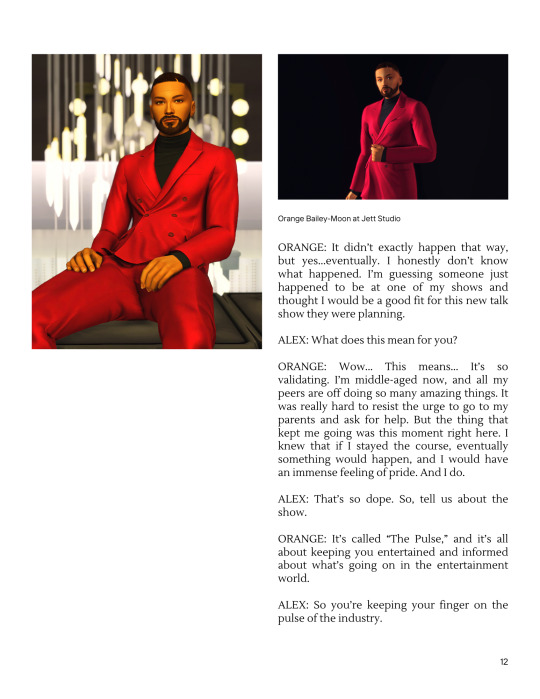
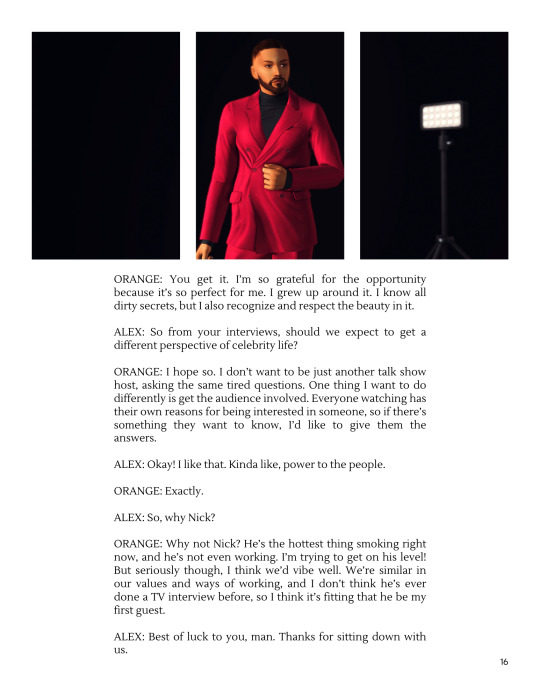
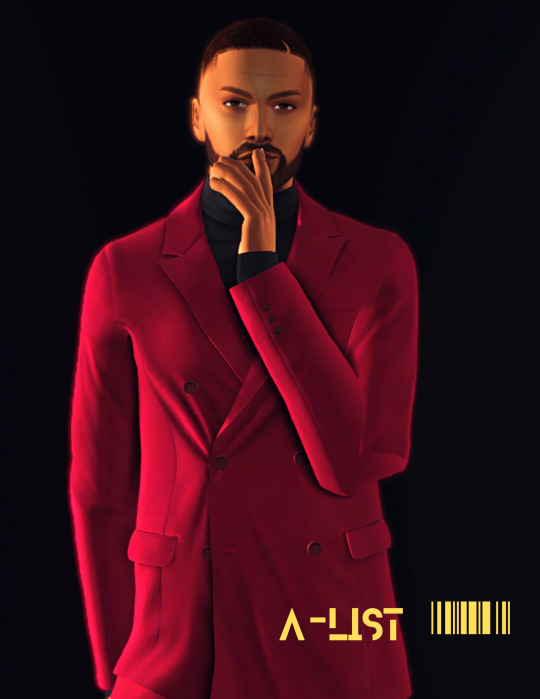

👀
What is this about you say? Stay tuned!
Thanks to @trumpets0ng and @ladybugsimblr for letting me use your sims' credentials lol. Walker Pearson from Jett Studios (trumpet) was the photographer, and Alex Greene (LB) was the author. He also wrote Bailey Kay's article.
(transcript under the cut)
A well-dressed man walked into the studio, swaggy and confident, with more drip than a coffee pot. His perfectly tailored suit glimmered under the stage lights, looking just as expensive as one would imagine it to be. My initial thought upon seeing this cat with a larger than life personality was, “Oh, great. Here comes another industry brat.” Then, he walked up to my assistant, smiled, extended his hand, and said, “Hi! I’m Orange.” That’s when I knew I’d been completely wrong about him.
I started off slow.
ALEX: How’ve you been? How’s life treating you?
ORANGE: Life is wonderful, thanks for asking.
I’m excited about my baby sister being back on the west coast! She wanted to spread her wings and moved east; that’s where she met and married her guy. But she’s a mom now, and my parents are getting old, so she’s back. I can’t wait to spend time with my nephew and get to know my brother-in-law better.
ALEX: Wow, okay. It’s always nice to have the family close. So where have you been all this time, my man?
He leaned back into the sofa with a huge sigh and a smile.
ORANGE: Where have I been… I’ve been everywhere, man!
ALEX: Oh word?
ORANGE: Yeah, man. I pride myself on not being a prideful person…which is probably the most proud thing I could say.
He laughs at his own joke, wiping fake sweat away from his brow. And all at once, he had me. I was sucked into his energy.
ORANGE: I appreciate everything my parents did for me, but I was never interested in following in their footsteps.
ALEX: Never?
ORANGE: Not really. I was kinda artsy as a kid. I can sing, but I never had a passion for it. Don’t get me wrong…I’m a gregarious kind of guy, so I wanted to be in the public. Just not doing what my parents did.
ALEX: So what did you do?
ORANGE: Whatever I could. I didn’t want it said of me that my life was handed to me, so I moved out, got a crappy apartment, and worked as a barista for a while. People told me I was funny, so I started writing sketches and going to the comedy clubs.
ALEX: And then sim.TV called.
Laughter erupts, startling everyone on set. It’s loud and hearty and sounds like that uncle at the family barbeque.
ORANGE: It didn’t exactly happen that way, but yes…eventually. I honestly don’t know what happened. I’m guessing someone just happened to be at one of my shows and thought I would be a good fit for this new talk show they were planning.
ALEX: What does this mean for you?
ORANGE: Wow… This means… It’s so validating. I’m middle-aged now, and all my peers are off doing so many amazing things. It was really hard to resist the urge to go to my parents and ask for help. But the thing that kept me going was this moment right here. I knew that if I stayed the course, eventually something would happen, and I would have an immense feeling of pride. And I do.
ALEX: That’s so dope. So, tell us about the show.
ORANGE: It’s called “The Pulse,” and it’s all about keeping you entertained and informed about what’s going on in the entertainment world.
ALEX: So you’re keeping your finger on the pulse of the industry.
ORANGE: You get it. I’m so grateful for the opportunity because it’s so perfect for me. I grew up around it. I know all dirty secrets, but I also recognize and respect the beauty in it.
ALEX: So from your interviews, should we expect to get a different perspective of celebrity life?
ORANGE: I hope so. I don’t want to be just another talk show host, asking the same tired questions. One thing I want to do differently is get the audience involved. Everyone watching has their own reasons for being interested in someone, so if there’s something they want to know, I’d like to give them the answers.
ALEX: Okay! I like that. Kinda like, power to the people.
ORANGE: Exactly.
ALEX: So, why Nick?
ORANGE: Why not Nick? He’s the hottest thing smoking right now, and he’s not even working. I’m trying to get on his level! But seriously though, I think we’d vibe well. We’re similar in our values and ways of working, and I don’t think he’s ever done a TV interview before, so I think it’s fitting that he be my first guest.
ALEX: Best of luck to you, man. Thanks for sitting down with us.
#ts4 story#sims 4 story#sims story#Piersons and Friends#the piersons#orange bailey moon#nick wilkinson#the pulse
98 notes
·
View notes
Text




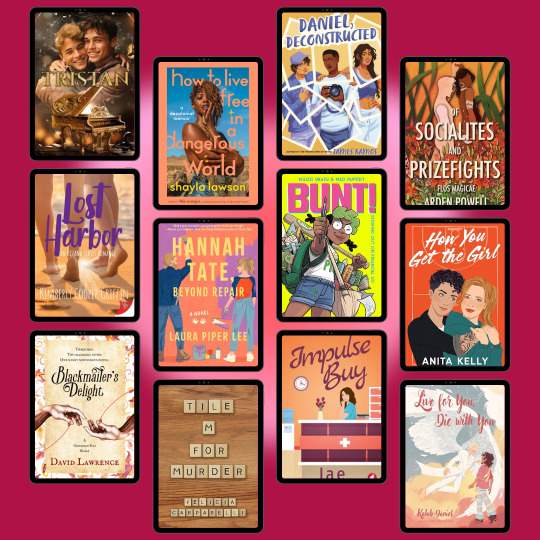
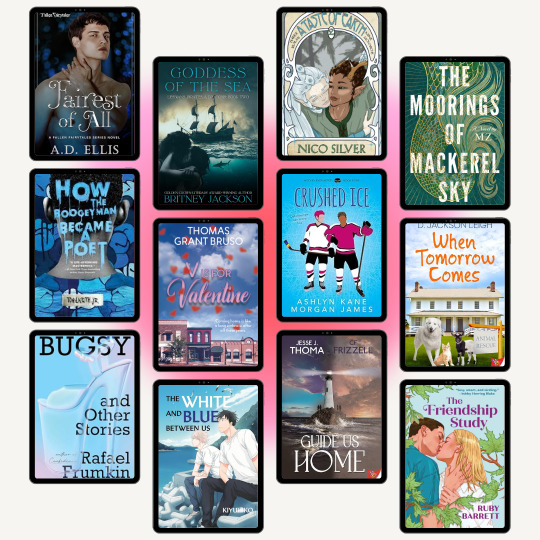
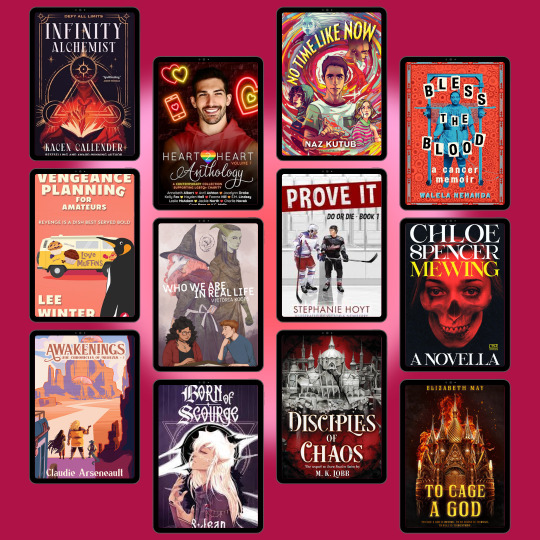
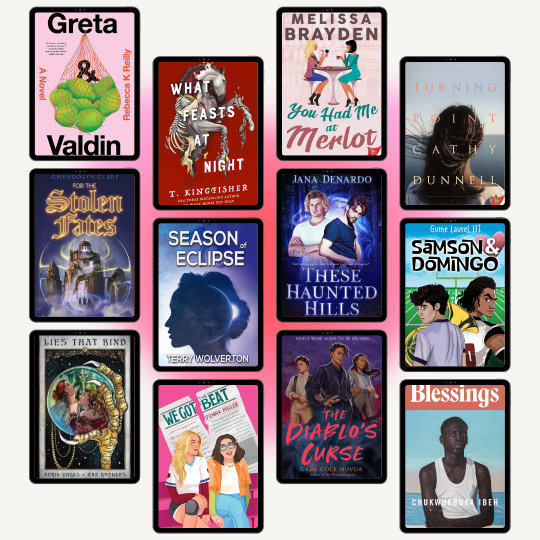

🌈 Queer Books Coming Out in February 2024
🌈 Good afternoon, my bookish bats! Struggling to keep up with all the amazing queer books coming out this month? Here are a FEW of the stunning, diverse queer books you can add to your TBR before the year is over. Remember to #readqueerallyear! Happy reading!
❤️ We Ate the Dark by Mallory Pearson 🧡 The Paper Boys by D.P. Clarence 💛 Skater Boy by Anthony Nerada 💚 Your Shadow Half Remains by Sunny Moraine 💙 A Vicious Game by Melissa Blair 💜 Clarion Call by Cayla Fay ❤️ Relit: 16 Latinx Remixes of Classic Stories edited by Sandra Proudman 🧡 The Absinthe Underground by Jamie Pacton 💛 Truthfully, Yours by Caden Armstrong 💙 Outsider by Jade du Preez 💜 Cross My Candy Heart by A.C. Thomas 🌈 The Tainted Cup by Robert Jackson Bennett
❤️ An Education in Malice by S. T. Gibson 🧡 The Imposition of Unnecessary Obstacles by Malka Ann Older 💛 Never a Bridesmaid by Spencer Greene 💚 The Rewind by Nicole Stiling 💙 Good Christian Girls by Elizabeth Bradshaw 💜 The Fox Maidens by Robin Ha ❤️ The Terrible by Tessa Crowley 🧡 Blood Rage by Ileandra Young 💛 Call of the Sea by Emily B. Rose 💙 Sign Me Up by C.H. Williams 💜 Ways and Means by Daniel Lefferts 🌈 Peaceful in the Dark by A.A. Fairview
❤️ We Are Only Ghosts by Jeffrey L. Richards 🧡 Dead Ringer by Robyn Nyx 💛 Somacultural Liberation by Dr. Roger Kuhn 💚 Stormbringer by Erinn Harper 💙 A Saga of Shields & Shadows by A.J. Shirley 💜 Ghost Town by R.E. Ward ❤️ I Heard Her Call My Name by Lucy Sante 🧡 The Night Alphabet by Joelle Taylor 💛 Remedial Magic by Melissa Marr 💙 Bloom by N.R. Walker 💜 Entwined by Alex Alberto 🌈 Queer Newark edited by Whitney Strub
❤️ Tristan by Jesse Roman 🧡 How to Live Free in a Dangerous World by Shayla Lawson 💛 Daniel, Deconstructed by James Ramos 💚 Of Socialites & Prizefights by Arden Powell 💙 Lost Harbor by Kimberly Cooper Griffin 💜 Hannah Tate, Beyond Repair by Laura Piper Lee ❤️ Bunt! Striking Out on Financial Aid by Ngozi Ukazu & Mad Rupert 🧡 How You Get the Girl by Anita Kelly 💛 Blackmailer’s Delight by David Lawrence 💙 Tile M for Murder by Felicia Carparelli 💜 Impulse Buy by Jae 🌈 Live for You, Die With You by Kalob Dàniel
❤️ Fairest of All by A.D. Ellis 🧡 Goddess of the Sea by Britney Jackson 💛 A Taste of Earth by Nico Silver 💚 The Moorings of Mackerel Sky by M.Z. Emily Zack 💙 How the Boogeyman Became a Poet by Tony Keith 💜 V is for Valentine by Thomas Grant Bruso ❤️ Crushed Ice by Ashlyn Kane & Morgan James 🧡 When Tomorrow Comes by D. Jackson Leigh 💛 Bugsy & Other Stories by Rafael Frumkin 💙 The White and Blue Between Us by Kiyuhiko 💜 Guide Us Home by CF Frizzell & Jesse J. Thoma 🌈 The Friendship Study by Ruby Barrett
❤️ Infinity Alchemist by Kacen Callender 🧡 Heart2Heart edited by Annabeth Albert 💛 No Time Like Now by Naz Kutub 💚 Bless the Blood by Walela Nehanda 💙 Vengeance Planning for Amateurs by Lee Winter 💜 Who We Are in Real Life by Victoria Koops ❤️ Prove It by Stephanie Hoyt 🧡 Mewing by Chloe Spencer 💛 Awakenings by Claudie Arseneault 💙 Born of Scourge by S. Jean 💜 Disciples of Chaos by M.K. Lobb 🌈 To Cage a God by Elizabeth May
❤️ Greta & Valdin by Rebecca K Reilly 🧡 What Feasts At Night by T. Kingfisher 💛 You Had Me at Merlot by Melissa Brayden 💚 Turning Point by Cathy Dunnell 💙 For the Stolen Fates by Gwendolyn Clare 💜 Season of Eclipse by Terry Wolverton ❤️ These Haunted Hills by Jana Denardo 🧡 Samson & Domingo by Gume Laurel III 💛 Lies that Bind by Rae Knowles & April Yates 💙 We Got the Beat by Jenna Miller 💜 The Diablo's Curse by Gabe Cole Novoa 🌈 Blessings by Chukwuebuka Ibeh
❤️ Out There by Iris Eliot 🧡 At Her Service by Amy Spalding 💛 Green Dot by Madeleine Gray
#books#queer#queer book recs#queer books#sapphic books#sapphic romance#lesbian romance#lesbian books#lesbian fiction#gay romance#gay books#lgbt author#lgbt writers#lgbtq books#books to read#book releases#book release#bi books#bisexual pride#bisexual books#batty about books#battyaboutbooks
51 notes
·
View notes